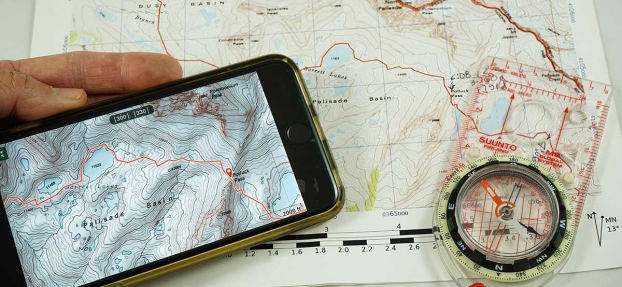Whether we go hiking in the mountains alone or in a group, it is essential to have a set of tools that will help us in tracking our position, helping us find the correct hiking path and enabling us to stay found. Despite the great technological advancement that has offered accurate navigation systems, GPS and trackers, it is prudent to not rely completely on technology and have some manual backup, just in case there is an emergency. In the following sections, the checklist for essential hiking navigation tools that must be present in a hiker’s bag is provided.
A GPS tracker and receiver : Having a GPS tracking device and receiver is a very reliable means of navigation while hiking. Great varieties of such devices with different features are available, and are the backbone of staying found.
A good compass : Though modern-day devices like the GPS offer a reliable positioning, it is advisable to have a manual compass in the bag. It might happen that the battery of the GPS or other electronic tracking devices is discharged, or that the devices develop some technical snag. In such an event, the manual compass will help because it does not need a battery.

A basic altimeter : An altimeter is a device that specifies the exact altitude of the hiker. This information is necessary for an accurate positioning on the topographic map of the hike and confirms that the hiker is on the right path, thereby reducing the chances of losing the way.
A set of maps : Maps are perhaps the oldest hiking navigation support systems. There are different kinds of maps available for different hiking trails and they provide a lot of information about the hiking conditions and routes. It is recommended that the hikers keep a set of all relevant maps with them. This will be very useful in case the hiking trails are altered due to environmental factors like heavy snowfall, landslides etc.
A good watch : For a hiker, a wrist watch is far more than a device to tell the time. These days, elaborate functions are incorporated into watches. These include features like calculating time of sun-set and sun-rise, chronograph, estimating the distance travelled etc. Having a good watch is indeed very helpful for a hiker.
A small note-book and pencils : While a lot of notes can be taken on smartphones, they run on battery and have a limited battery life. Therefore, they should only be used when there is no other alternative available. Notebooks are needed to scribble notes during the hike, to note the peculiar features of the hiking trail and to prepare a list of reminders etc. This information can also be shared easily with other hikers just by passing the paper to them.
A reliable navigation app : Having a reliable navigation app installed in smartphones serves as a good emergency backup if everything else fails.
The regular use of the above tools during hiking will make sure that the hiker stays on the right trail and that there are negligible chances of losing the track or getting lost. Hikers should not depend solely on electronic devices for determining their location.























